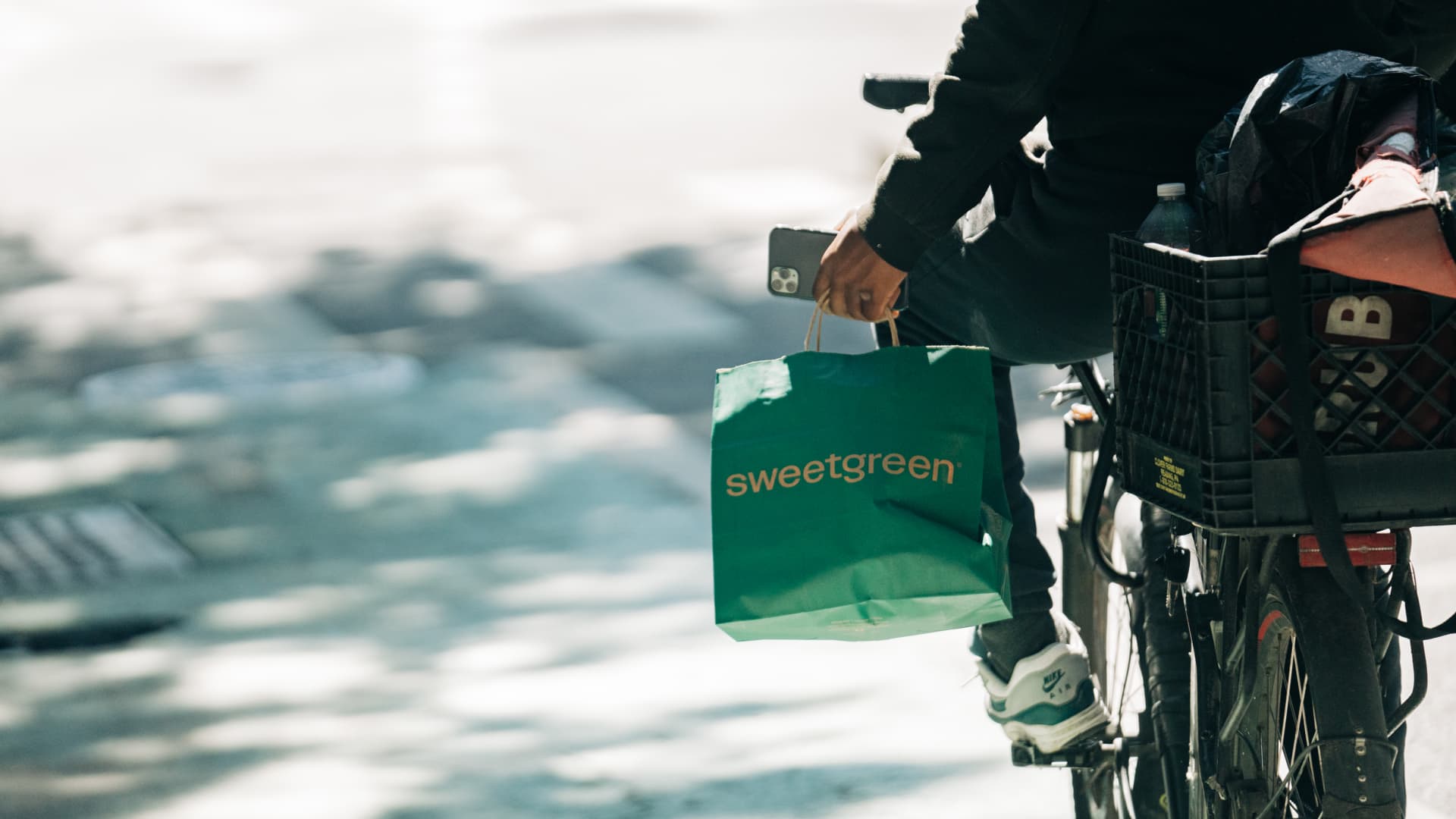
A food delivery messenger carries a take out bag outside aSweetgreen in Manhattan on September 14, 2023.
Jeenah Moon | The Washington Post | Getty Images
A highly popular group of weight loss and diabetes drugs is decreasing some consumers’ appetites — and also how much they spend on food.
Most people taking those medications, called GLP-1s, say they are spending less on eating out at restaurants and ordering takeout, according to a Morgan Stanley survey released on Tuesday. A smaller share of those surveyed say they are tightening their purse strings in the grocery store.
The findings add to the mounting concerns that soaring demand for GLP-1s could take a bite out of the bottom lines of some of the biggest restaurant companies and makers of packaged snacks like Doritos, Oreos and Hershey’s Kisses. GLP-1s include Novo Nordisk‘s blockbuster weight loss injection Wegovy and diabetes counterpart Ozempic, along with Eli Lilly‘s popular weight loss treatment Zepbound and diabetes injection Mounjaro.
The rising demand for these four drugs isn’t expected to ease anytime soon. In the new survey, Morgan Stanley analysts said they expect the market for GLP-1s to be worth $105 billion by 2030. They also estimate that 31.5 million people, or around 9% of the U.S. population, will take GLP-1s by 2035.
“There is growing evidence that the drugs have a meaningful impact on consumer behavior and spending on groceries and restaurants,” Morgan Stanley analysts said in the survey. “All of these dynamics suggest GLP-1 drugs’ impact across consumer sectors is set to increase as drug uptake grows and the drugs reshape behavior among a demographic group that represents a disproportionate share of calorie consumption.”
But many food and beverage companies have reassured investors over the last few months that it’s still unclear how much those drugs will lower their revenue. Morgan Stanley also said in the survey that GLP-1s are a manageable long-term pressure on restaurants, not an “existential risk.”
“Restaurants offer convenience and/or experience in addition to food, and that won’t change with GLP-1 usage,” the analysts said. But some restaurants may have to adapt to health-conscious consumer behaviors, they noted.
Healthier fast-casual restaurants and coffee are better positioned to manage the increasing consumer use of GLP-1s, including Cava, Chipotle, Sweetgreen and Starbucks, according to Morgan Stanley. Domestic service restaurants and “more indulgent” fast-casual restaurants could face more pressure, including Jack in the Box, Wendy’s, Wingstop, Shake Shack and Portillos.
Meanwhile, Morgan Stanley views Hershey as the most at-risk among packaged food companies given its American consumer-focused snacking portfolio. Companies that offer healthy foods should benefit from GLP-1s, including Vital Farms, Bellring Brands, Simply Good Foods, the firm said.
Among beverage companies, those that produce alcoholic drinks are at the highest risk. Those include Molson Coors, Boston Beer, Constellation Brands and Diageo, according to Morgan Stanley.
Boxes of Wegovy made by Novo Nordisk are seen at a pharmacy in London, Britain March 8, 2024.
Hollie Adams | Reuters
Morgan Stanley conducted the survey of 300 consumers who are currently taking GLP-1 drugs in February. Those people are “early in their weight loss journey,” but are making substantial changes to their diets and spending, according to the firm.
When asked to gauge how their monthly spending on eating out at restaurants has changed since starting a GLP-1, 63% of the consumers said they are spending less, 28% said they are spending about the same amount, and 9% said they are spending more. Meanwhile, 61% said they are spending less on deliveries or takeout from restaurants, 31% said they are spending around the same amount and 8% said they are spending more.
Fewer participants said they lowered their grocery spending since they started a GLP-1: 31% said they are spending less, 46% said they are spending around the same amount and 23% said they are spending more.
The survey also found that people tended to stick with the same restaurant but changed the kinds of meals they ordered.
When asked whether they finish less of the food they order in one sitting when dining out, 42% of participants said “always” or “most of the time,” and 44% said “occasionally.” Forty-one percent said they are “always” or “most of the time” ordering smaller portions of food overall, while 43% said they are only sometimes doing that.
Consumers in the survey reported reduced food consumption across the board, but the difference is most notable on snacks, confections, carbonated and sugary drinks and alcohol, according to the Morgan Stanley survery. Roughly half of people reported cutting consumption of regular sodas, alcohol and salty snacks by 50% or more since starting on weight loss drugs. Twenty-two percent reported stopping alcohol consumption entirely.
Based on those results, Morgan Stanley forecasts that consumption of ice cream, cakes, cookies, candy, chocolate, frozen pizzas, chips and regular sodas could fall 4% to 5% by 2035. The firm also expects a roughly 3% decrease in consumption of alcohol, frozen popcorn or pretzels, crackers, cereals, cheese, gum or mints and energy drinks, among others.
Pre-packaged fruit juices, soups, sports drinks, coffee, frozen diet meals, tea, granola and energy bars are among the foods that will see the least reduction in consumption, the firm said.
Notably, the survey also found that 40% of participants reported smoking traditional cigarettes at least weekly before starting a GLP-1, but that number declined to 24% after treatment. Weekly e-cigarette use similarly fell from 30% to 16% of respondents.
However, Morgan Stanley said it is cautious about drawing conclusions from the survey on the impact of GLP-1s on addictive behaviors such as smoking. The firm said it is monitoring the ongoing medical research in that area.







